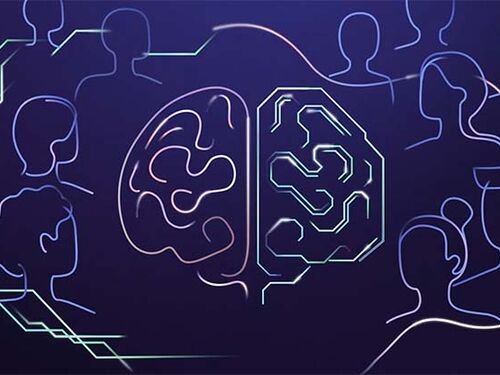Trading Secrets: What Brain Science and AI Can Learn from Each Other
Impact Story
By Eva Childers
Last update March 19, 2025
Due to the rapid rise and impact of artificial intelligence (AI) tools such as ChatGPT, ClaudeAI, and DeepSeek over the past several years, the National Academies’ Forum on Neuroscience and Nervous System Disorders (Neuroscience Forum) set out to explore how knowledge about the brain could potentially shape better AI models, and, conversely, how AI models might help us learn more about the brain. The Forum also wanted to examine how neuroscience could contribute to the development of science-based policy and education about AI. To accomplish this, a group of Forum members comprising computer scientists, neuroscientists, clinicians, ethicists, and regulators came together to plan a public workshop.
The planning committee, co-chaired by Dr. Magali Haas, founder and board chair of Cohen Veterans Bioscience, and Dr. Terence Sejnowski, Francis Crick Professor at the Salk Institute for Biological Sciences, wanted the workshop to emphasize how neuroscience is uniquely situated to expand the integration of AI into research and clinical care. Relatedly, committee members pointed out that neuroscience tools can help researchers gain a better understanding of how AI systems work, especially given how much the field of neuroscience has grown over the past several decades. These concepts became the driving force of the agenda for the 1.5-day event.
In addition to exploring the bidirectional contributions of AI and neuroscience, the committee also wanted to discuss what additional research is needed to ensure AI and neuroscience can continue to evolve together. Committee members explored the potential impact of AI for medical care (especially in digital interventions) and the development of personalized care, which became a focal point for the second half of the agenda. Underscoring the importance of incorporating patient and lived experience into the development of research and AI algorithms for brain-related care was also a priority. So, utilizing their vast networks and connections, members of the planning committee invited speakers with a broad range of expertise including academic research, application development, international policy development, community outreach, and lived experience. And a workshop was born.
A convening of ‘great minds’
The March 2024, “Exploring the Bidirectional Relationship Between Artificial Intelligence and Neuroscience,” event began with a discussion of the ways in which the brain continues to inspire the development of machine learning and AI. For example, two popular machine learning approaches, deep learning and reinforcement learning, which are routinely used in AI tools, are based on the structure of the primate visual processing system and dopamine pathways in the basal ganglia, respectively. Even though AI’s ability to process large amounts of data has helped to generate new hypotheses, theories, and neuroscience experiments, there are still things it can ascertain from the human brain and how it functions—especially given that the brain can learn new skills or facts faster and with fewer examples compared to current AI models.
Workshop participants also explored the concept of integrating AI into clinical care to assist neurologists and psychiatrists in addressing the increasing prevalence of brain disorders. For example, conversational AI chatbots could assist clinicians by helping patients feel more at ease when receiving mental health support. This may come in the form of mood tracking or mindfulness practice tools. Having AI assist with other tasks such as speech transcription or note-taking could allow clinicians to have more time to connect with patients.
Amid the possibilities, however, serious challenges were identified. Developing guidelines and standards to minimize and address mistakes made by AI tools that could impact patient care will be critical. And for AI to be widely integrated into neuroscience research and clinical care, establishing public trust must be prioritized. Incorporating user feedback at every stage of the AI design process, creating accessible education, and authentically engaging with communities could help secure that trust.
Spotlighting the role of collaboration
Ultimately, the workshop highlighted the unique relationship between neuroscience and AI, as well as the importance of increasing the dialogue between neuroscientists, computer scientists, clinicians, and policymakers to develop more evidence-based AI guidance and education. The Neuroscience Forum as a whole gained tremendous insights that will fuel future planning and continued collaboration around this vitally important topic.
Watch a short animation about AI and neuroscience below and access the full workshop proceedings document here.
Exploring the Bidirectional Relationship Between Artificial Intelligence and Neuroscience

To stay connected with the Forum and learn more about upcoming events, such as a workshop addressing human resilience, sign up for our emails here. Eva Childers, Ph.D., is a Program Officer with the Forum on Neuroscience and Nervous System Disorders under the Board of Health Sciences Policy at the National Academies of Sciences, Engineering, and Medicine.
More like this
Discover
Events
Right Now & Next Up
Stay in the loop with can’t-miss sessions, live events, and activities happening over the next two days.
NAS Building Guided Tours Available!
Participate in a one-hour guided tour of the historic National Academy of Sciences building, highlighting its distinctive architecture, renowned artwork, and the intersection of art, science, and culture.


